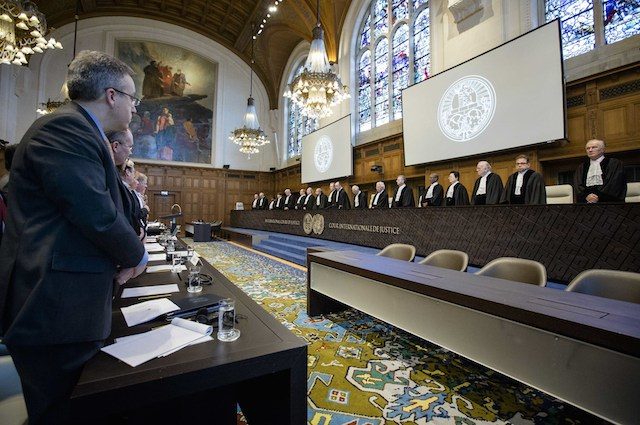SUMMARY
This is AI generated summarization, which may have errors. For context, always refer to the full article.

THE HAGUE, Netherlands (UPDATED) – The UN’s highest court on Tuesday, February 3, rejected rival claims of genocide by former foes Croatia and Serbia in landmark rulings over the bloody Balkans wars of the 1990s.
International Court of Justice chief judge Peter Tomka dismissed Zagreb’s claim that Serb forces committed genocide during Croatia’s war of independence.
He made a similar ruling in a counter-claim by Belgrade over a Croatian counter-offensive that forced 200,000 Serbs to flee after the last major battle of the 1991-1995 war.
The case had been described by Serbian Foreign Minister Ivica Dacic as perhaps one of the “most important events” determining his country’s relations with Croatia.
Zagreb dragged Belgrade before the ICJ in 1999 on genocide charges linked to the war in Croatia during the bloody breakup of the former Yugoslavia.
Serbia was accused of ethnic cleansing as a “form of genocide” in the town of Vukovar and other areas, leading to large numbers of Croats being displaced, killed or tortured and their property destroyed.
About 20,000 people died in the conflict, one of several bloody wars that shook the Balkans in the 1990s.
Vukovar was captured after a three-month-long attack by the Yugoslav army (JNA) and Serb rebels.
After its fall, about 22,000 non-Serbs were expelled, and about 350 people from the Vukovar region are still reported missing.
Zagreb had wanted the ICJ judges to order Belgrade to pay compensation.
Belgrade responded with a counter-suit in 2010, saying about 200,000 ethnic Serbs were forced to flee when Croatia launched a military operation to retake its territory in 1995.
Following Zagreb’s counter-offensive, called Operation Storm, the proportion of ethnic Serbs in Croatia shrank from 12 percent to four percent.
Belgrade was outraged in 2012 when Operation Storm’s Croatian military commander, Ante Gotovina, was acquitted on appeal before the Hague-based International Criminal Tribunal for the former Yugoslavia (ICTY).
“The irony is that Croatia… which with its forceful separatism, triggered an avalanche of the horrid civil war in the former Yugoslavia, is accusing someone else of genocide,” Serbia said in a statement as the case was being heard last year.
Genocide hardest to prove
So far the ICJ, which rules in disputes between states, has recognized only one genocide case since opening its doors in 1946.
Genocide is the most serious of international crimes but also the hardest to prove.
In 2007 the court ruled that genocide had taken place in 1995, at Srebrenica in neighboring Bosnia, when almost 8,000 Muslim men and boys were slaughtered and their bodies dumped in mass graves by Bosnian Serb troops that overran a UN-protected enclave.
The decisions in the current case, which was heard in March last year, were reached by a 17-judge bench.
Both Belgrade and Zagreb had said ahead of the verdict that they would accept the ruling.
Croatian Justice Minister Orsat Miljenic had said that Zagreb’s main goal was to “present what happened in the war and that was aggression against Croatia”.
Serbia’s Dacic said on Sunday, February 1: “This will be one of perhaps the most important events for our bilateral relations with Croatia.”
“It will probably be the end of a process that has lasted for 15-20 years (and) will put an end to both sides’ fight to prove who the worst criminal is.”
“Maybe we’ll have an opportunity to leave the past behind and turn towards the future.” – Rappler.com
Add a comment
How does this make you feel?
There are no comments yet. Add your comment to start the conversation.